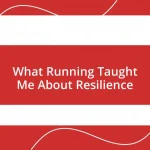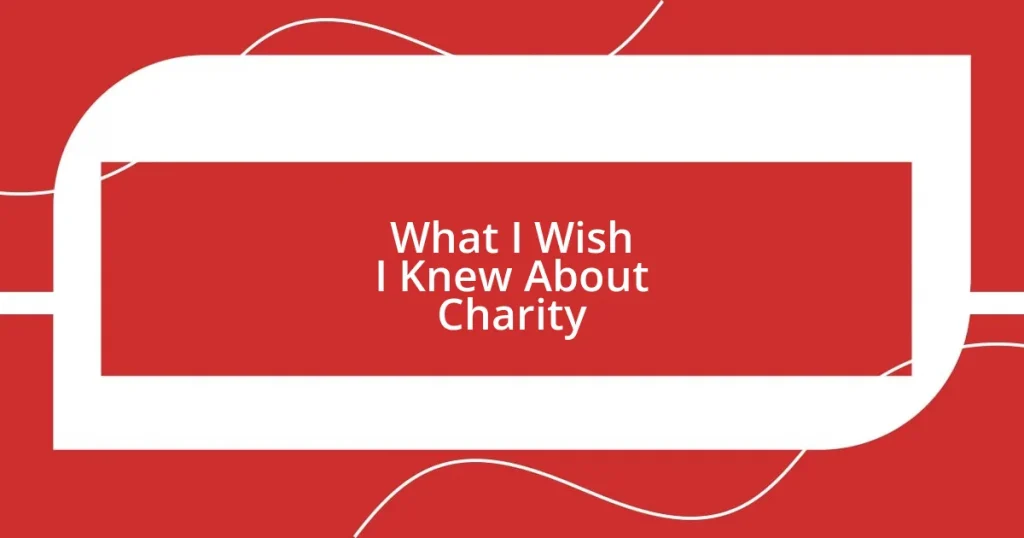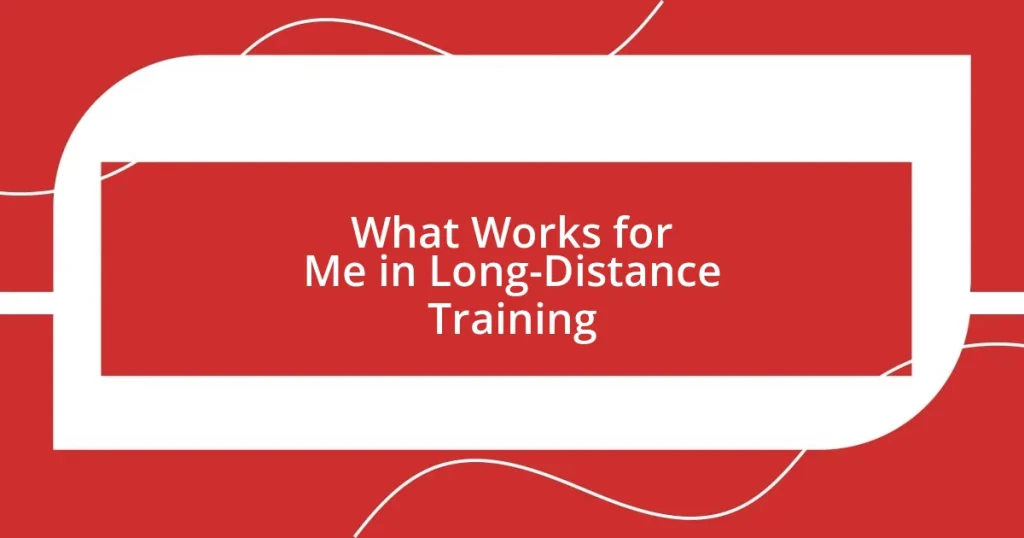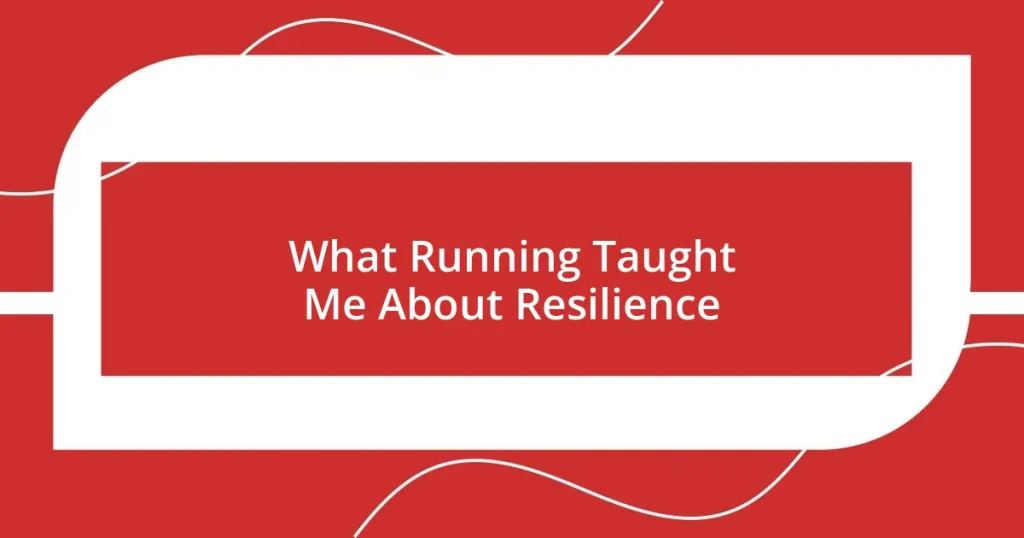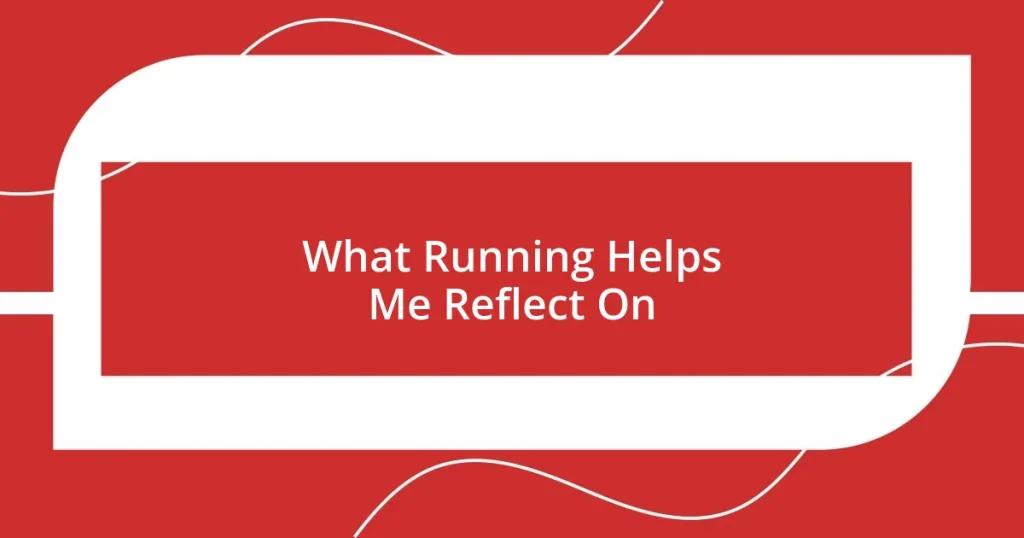Key takeaways:
- Charity is about building connections and empowering individuals, not just meeting immediate needs.
- Research is crucial before donating to ensure alignment with personal values and to support organizations with transparency and effectiveness.
- Choosing causes that resonate personally enhances fulfillment and strengthens community bonds.
- Both volunteering and donating have unique benefits; personal engagement often fosters deeper connection and understanding of impact.
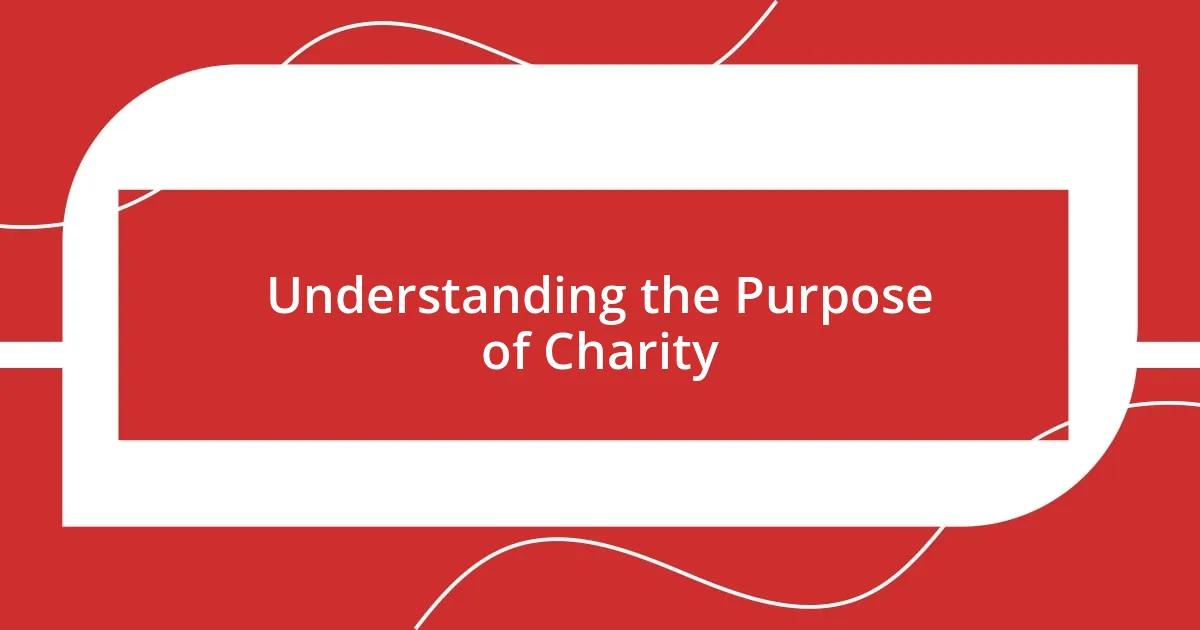
Understanding the Purpose of Charity
Understanding the purpose of charity goes beyond simply giving; it’s about creating a connection. I remember my first experience volunteering at a local food bank. At first, I thought it was just about handing out food, but I quickly realized that it was about restoring dignity and building community. Isn’t it powerful to think that a simple act of kindness can ripple out and strengthen the very fabric of society?
Charity serves as a mirror reflecting our values and priorities. When I see someone generously donating their time or resources, it makes me ponder: what drives them? For me, it ignited a spark to become more involved in causes I care about deeply. It’s this shared motivation that, I believe, can inspire others to give back and create meaningful change.
Moreover, understanding charity’s purpose is about bridging gaps between differing circumstances. I once met a woman who had fallen on hard times but, after receiving help, turned her life around and eventually became a volunteer herself. Have you ever thought about how transformative that cycle of giving and receiving can be? It’s a compelling reminder that charity isn’t just about alleviating immediate needs; it’s about empowering individuals and fostering resilience in our communities.
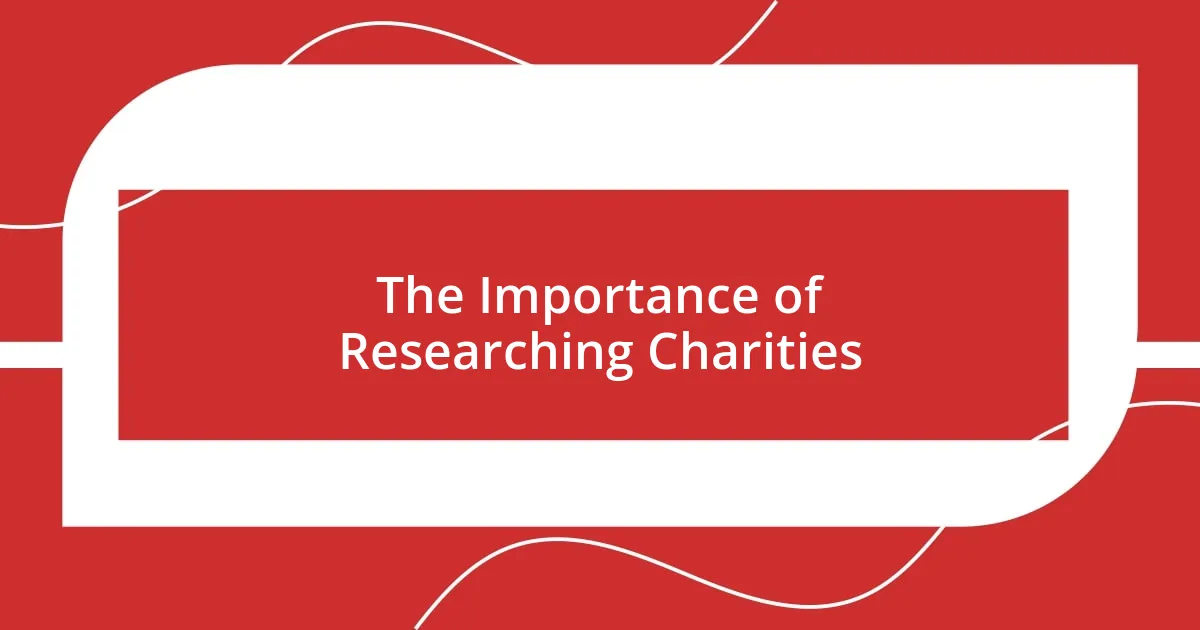
The Importance of Researching Charities
When diving into the world of charity, I can’t stress enough the importance of researching the organizations you’re considering supporting. I once blindly donated to a charity that promised great change but later discovered they had questionable practices and inefficient use of funds. It felt unsettling to realize my contribution didn’t support the causes I cared about. Knowing the organization’s mission, financial health, and impact can make all the difference in where your efforts are directed.
I’ve learned that not all charities operate at the same level, and this knowledge can steer you toward making more informed choices. A friend of mine invested time researching a local charity before getting involved. She found that their transparency and accountability made them stand out. This gave her confidence in her support, knowing the impact was genuine and meaningful.
Moreover, transparency isn’t just a buzzword; it’s the bedrock of effective charity. It’s heartening to find organizations that openly share their achievements and struggles. When I came across a charity with detailed annual reports, it showed me they valued accountability. I could feel my trust deepen; I was more than just a donor – I was part of a movement committed to true change.
| Aspect | Importance of Researching |
|---|---|
| Impact of Donations | Ensures contributions align with personal values. |
| Transparency | Aids in selecting organizations that practice accountability. |
| Effectiveness | Identifies charities that achieve measurable results. |
| Community Trust | Strengthens the relationship between donors and charities. |
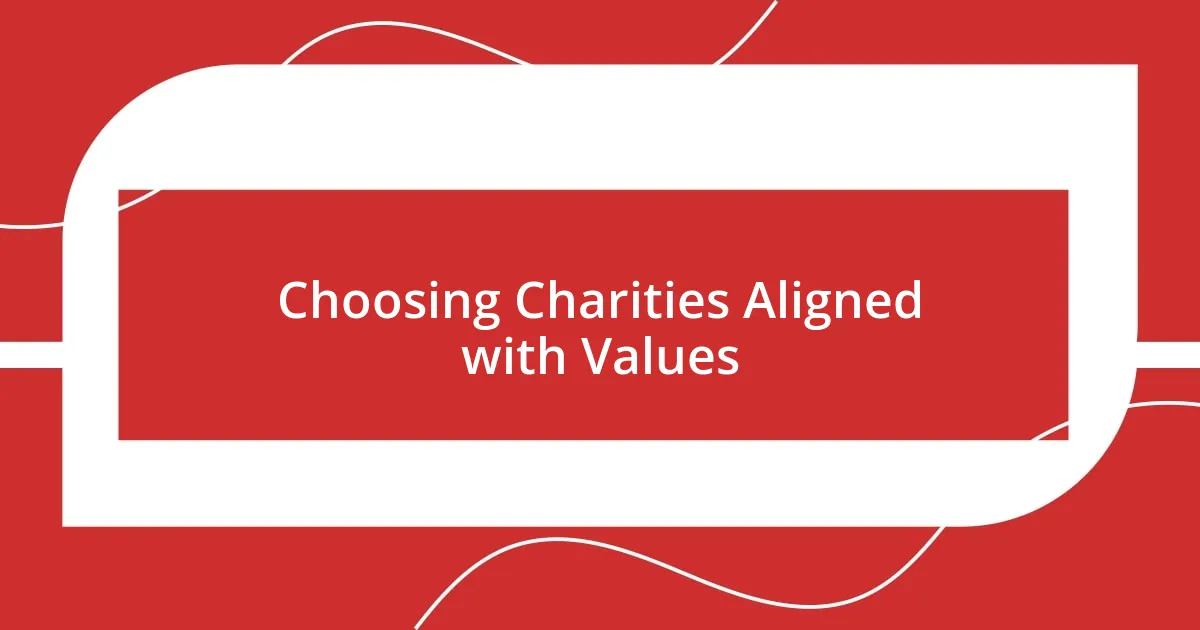
Choosing Charities Aligned with Values
When I think about choosing charities that resonate with my values, I can’t help but feel a sense of connection and personal responsibility. I once volunteered with a local animal rescue that truly echoed my passion for animal welfare. It felt incredibly rewarding to contribute to a cause that I genuinely cared about, and seeing the positive impact of our collective efforts made me even more committed. Aligning my contributions with my beliefs not only amplifies the experience but also fosters a deeper relationship with the cause.
Here are some key points to consider when selecting charities that align with your values:
- Personal Passion: Choose causes that resonate with your interests or experiences.
- Shared Values: Look for organizations that reflect your ethical beliefs and priorities.
- Community Impact: Assess how a charity positively affects the community or environment.
- Engagement Opportunities: Seek out organizations that offer volunteer positions or involvement in their projects.
- Sustainability Factors: Evaluate whether the charity promotes long-term solutions rather than temporary fixes.
Finding a charity that speaks to your heart can be transformative. The joy I felt when participating in an environmental cleanup project was palpable, and it reaffirmed my commitment to sustainability. I believe that such experiences cultivate a sense of belonging and purpose, enhancing our collective efforts toward meaningful change.
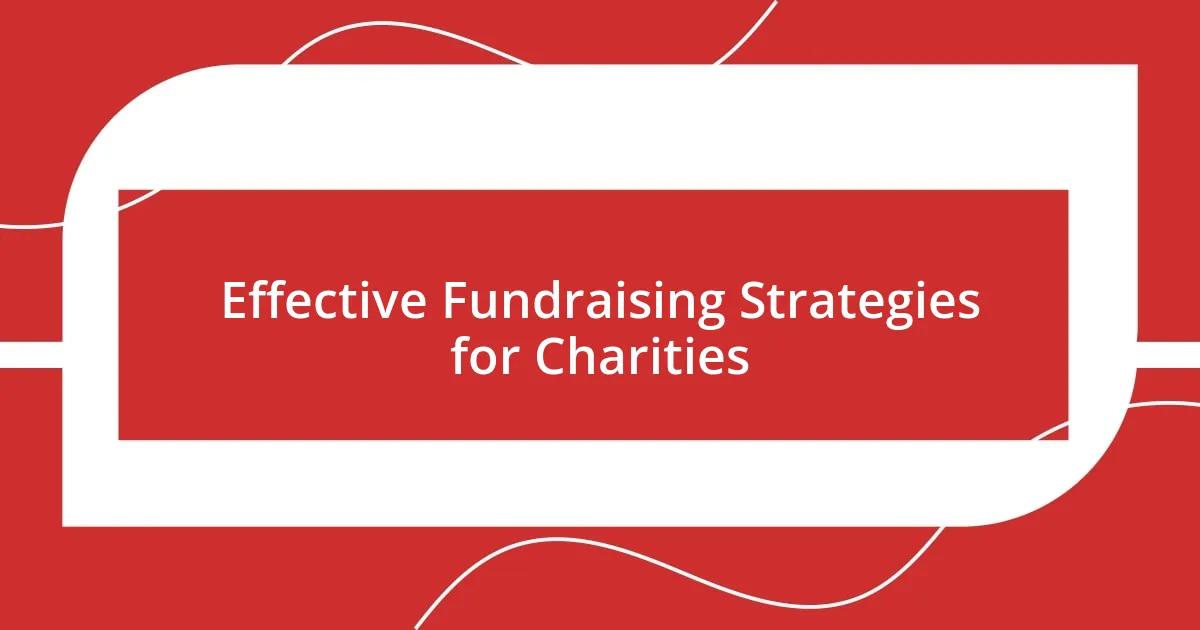
Effective Fundraising Strategies for Charities
When I think about effective fundraising strategies for charities, one approach that stands out is hosting community events. I remember attending a charity gala that was not only enjoyable but also raised significant funds through ticket sales and auctions. These gatherings create a sense of camaraderie and purpose, allowing attendees to connect while contributing to a cause they care about. Isn’t it wonderful how a fun evening can also fuel social change?
Another strategy I’ve found impactful is leveraging social media for crowdfunding campaigns. A friend of mine launched an online fundraising drive for a local shelter and utilized platforms like Facebook and Instagram to spread the word. The response was overwhelming! I realized how vital it is to share compelling stories and visuals that inspire action. Social media can amplify a charity’s reach, turning supporters into active fundraisers with just a few clicks.
Lastly, I’ve observed that building relationships with local businesses can create mutually beneficial partnerships. Once, a small coffee shop partnered with a non-profit to host a percentage-of-sales day. The result? Increased visibility for the charity and more customers drawn in by the cause. This kind of collaboration enriches the community spirit and amplifies fundraising potential. It makes me wonder: how can we cultivate more of these partnerships in our own neighborhoods?
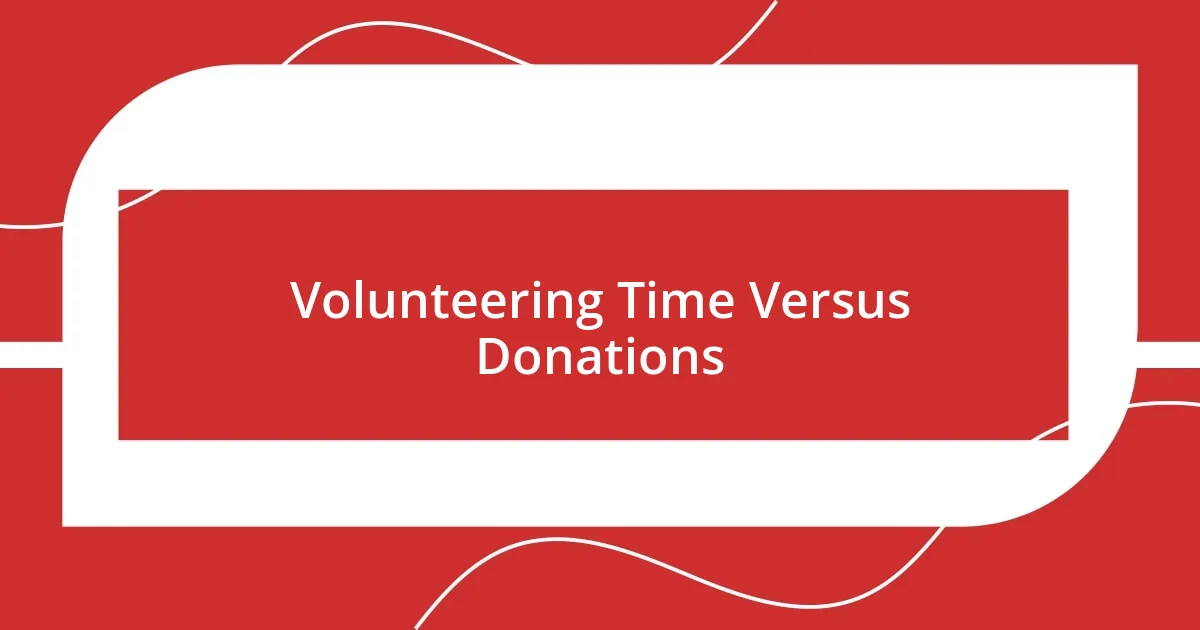
Volunteering Time Versus Donations
When it comes to the debate between volunteering my time and making monetary donations, I’ve often found that each choice carries its own kind of weight. I remember early in my charity journey, there was a time I chose to donate instead of volunteering. While my contribution helped fund a project, I felt a lingering sense of detachment. I think back and wonder: would I have felt differently about the impact if I had been physically present, witnessing the positive change firsthand?
On the other hand, volunteering has brought me a deep sense of fulfillment that a donation often lacks. I recall a day spent serving meals at a local shelter; it was not just about feeding those in need, but about creating connections and sharing stories with people from different walks of life. Those moments were rich with emotions, and I left feeling enriched and inspired. This experience taught me that time spent engaging directly can often be more transformative than any amount of money given.
That said, I’ve also seen how donations can catalyze significant changes when time isn’t as readily available. Balancing my commitments sometimes means choosing to donate financially rather than volunteering. I’ve learned that it’s really about the intention behind the contribution, whether in time or treasure. I often ask myself: how can I best utilize my resources to support a cause I care about? This ongoing reflection challenges me to appreciate the value of both volunteering and donating.
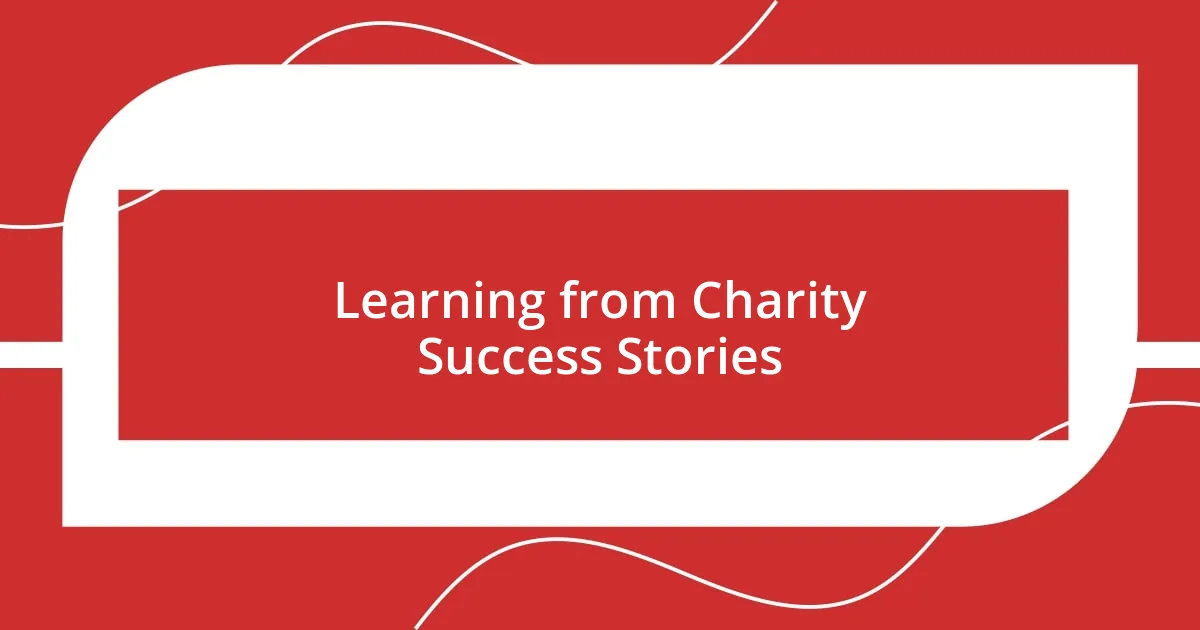
Learning from Charity Success Stories
One standout lesson I’ve drawn from charity success stories is the power of grassroots movements. I once participated in a small initiative aimed at providing school supplies to underprivileged children in my community. It started with just a handful of volunteers but quickly gained traction through word of mouth. Seeing how passionate individuals can come together for a common goal made me realize that you don’t need a massive organization to create real change—just the right people and the motivation to act.
Another inspiring story comes from a charity focused on mental health awareness. They successfully organized a yearly awareness walk, attracting hundreds of participants. I joined that first year, and the energy was palpable; everyone came together to support a cause close to their hearts. It made me think: how powerful is it when personal stories unite us? The shared experiences of love, loss, and healing foster a strong sense of community and purpose, which is a vital factor in any successful charity endeavor.
Reflecting on these stories, it’s clear that understanding your audience is crucial. I remember a campaign where the charity redefined its messaging after some initial struggles. By listening to community feedback and adjusting their approach, they eventually created a campaign that resonated deeply. This experience taught me that adaptability and responsiveness not only enhance engagement but also inspire loyalty. In what ways can we emulate this practice in our own charitable efforts?

